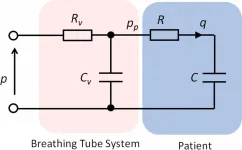Scientists discover a new promising target for diabetes treatment
2021-01-27
(Press-News.org) Researchers have discovered a novel and druggable insulin inhibitory receptor, named inceptor. The latest study from Helmholtz Zentrum Muenchen, the Technical University of Munich and the German Center for Diabetes Research is a significant milestone for diabetes research as the scientific community celebrates 100 years of insulin and 50 years of insulin receptor discovery. The blocking of inceptor function leads to an increased sensitisation of the insulin signaling pathway in pancreatic beta cells. This might allow protection and regeneration of beta cells for diabetes remission.
Diabetes mellitus is a complex disease characterized by the loss or dysfunction of insulin-producing beta cells in the islets of Langerhans, a specialist "micro-organ" in the pancreas that controls systemic blood sugar levels. Diabetes complications, such as chronic high blood sugar, systemic metabolic failure and, in the long-term, multi-organ damage, create enormous medical and social burdens and leads to premature death. Currently no pharmacological treatment can stop or reverse disease progression. Previous studies have demonstrated that intensive insulin therapy has the potential for improved blood sugar control and diabetes remission but also leads to unintended weight gain and even more severe side effects, such as an increased risk of deep drop in blood sugar causing unawareness.
Heiko Lickert's* research focuses on the development of regenerative approaches to treat diabetes complementary and alternative to the classical immunological and metabolic therapies. "Insulin resistance in pancreatic beta cells causes diabetes. Therapies that sensitize those cells to insulin may protect patients with diabetes against beta cell loss and failure", says Lickert. With the discovery of the insulin inhibitory receptor, his research group has found a promising molecular target for beta cell protection and regeneration therapy that does not carry the unintended side effects of intensive insulin therapy.
In experiments with mice, the researchers showed that the function of inceptor is to shield the insulin-producing beta cells from constitutive insulin pathway activation. Remarkably, inceptor is upregulated in diabetes and by blocking insulin signaling it might contribute to insulin resistance.
What happens if the function of inceptor is inhibited genetically or pharmacologically? The group explored this question by knocking out inceptor in beta cells and by blocking its function using monoclonal antibodies. "The result was exactly what we were hoping for: Insulin signaling and the functional beta cell mass was increased. This makes inceptor a very promising target to treat the root cause of diabetes, the loss and dysfunction of beta cells," says Ansarullah, one of the first-authors of the study published in Nature and diabetes researcher at Helmholtz Zentrum München.
"Frederick Banting noted already in his Nobel Prize lecture for the discovery of the life-saving drug insulin a hundred years ago that 'Insulin is not a cure for diabetes, but a treatment of the symptoms'. This has not changed in the last century. Our goal for future research is to leverage on the discovery of inceptor and develop drugs for beta cell regeneration. This could be beneficial for patients with type 1 and 2 diabetes and ultimately lead to diabetes remission", states Lickert.
"A hundred years ago, the discovery of insulin has transformed a deadly illness into a manageable disease. Our discovery of the insulin inhibitory receptor now is another important step to finally get rid of the disease," says Matthias Tschöp, CEO at Helmholtz Zentrum München. "While the COVID-19 pandemic represents an immediate threat we will overcome, we must not forget that diabetes remains one of the biggest and fastest growing killers on our planet. With a series of recent breakthroughs, now including the discovery of inceptor, our Helmholtz Diabetes Center is doubling down on its mission that is a world without diabetes."
INFORMATION:
*Heiko Lickert is Director of the Institute of Diabetes and Regeneration Research at Helmholtz Zentrum Muenchen, Professor and Chair of Beta Cell Biology at the Technical University of Munich and member of the German Center for Diabetes Research.
Original publication
Ansarullah et al., 2021: Inceptor counteracts insulin signalling in β-cells to control glycaemia. Nature, DOI: 10.1038/s41586-021-03225-8
Helmholtz Zentrum Muenchen
Helmholtz Zentrum Muenchen is a research center with the mission to discover personalized medical solutions for the prevention and therapy of environmentally-induced diseases and promote a healthier society in a rapidly changing world. It investigates important common diseases which develop from the interaction of lifestyle, environmental factors and personal genetic background, focusing particularly on diabetes mellitus, allergies and chronic lung diseases. Helmholtz Zentrum Muenchen is headquartered in Neuherberg in the north of Munich and has about 2,500 staff members. It is a member of the Helmholtz Association, the largest scientific organization in Germany with more than 40,000 employees at 19 research centers.
[Attachments] See images for this press release:

ELSE PRESS RELEASES FROM THIS DATE:
2021-01-27
Linking molecular components through amide bonds is one of the most important reactions in research and the chemical industry. In the journal Angewandte Chemie, scientists have now introduced a new type of reaction for making amide bonds. Called an ASHA ligation, this reaction is fast, efficient, works under mild aqueous conditions, and is broadly applicable.
Amide bonds are the bond between a carbonyl carbon (C=O) and an organic nitrogen atom. It is amide bonds that link individual amino acids together into proteins and bind monomers into polyamide plastics like perlon ...
2021-01-27
Researchers at Vanderbilt University Medical Center (VUMC) and the University of Texas Medical Branch (UTMB) at Galveston have discovered what may be the Achilles' heel of the coronavirus, a finding that may help close the door on COVID-19 and possibly head off future pandemics.
The coronavirus is an RNA virus that has, in its enzymatic toolkit, a "proofreading" exoribonuclease, called nsp14-ExoN, which can correct errors in the RNA sequence that occur during replication, when copies of the virus are generated.
Using cutting-edge technologies and novel bioinformatics approaches, the researchers discovered that this ExoN also regulates the rate of recombination, the ability of the coronavirus ...
2021-01-27
Reaching zero net emissions of carbon dioxide from energy and industry by 2050 can be accomplished by rebuilding U.S. energy infrastructure to run primarily on renewable energy, at a net cost of about $1 per person per day, according to new research published by the Department of Energy's Lawrence Berkeley National Laboratory (Berkeley Lab), the University of San Francisco (USF), and the consulting firm Evolved Energy Research.
The researchers created a detailed model of the entire U.S. energy and industrial system to produce the first detailed, peer-reviewed study of how to achieve carbon-neutrality by 2050. According to the Intergovernmental Panel on Climate Change (IPCC), the world must reach zero net CO2 ...
2021-01-27
CHAMPAIGN, Ill. -- Culture, civic-mindedness and privacy concerns influence how willing people are to share personal location information to help stem the transmission of COVID-19 in their communities, a new study finds. Such sharing includes giving public health authorities access to their geographic information via data gathered from phone calls, mobile apps, credit card purchases, wristband trackers or other technologies.
Reported in the International Journal of Geo-Information, the study will help public health officials better tailor their COVID-19 mitigation strategies to specific cultural contexts, the ...
2021-01-27
Climate change mitigation is about more than just CO2. So-called "short-lived climate-forcing pollutants" such as soot, methane, and tropospheric ozone all have harmful effects. Climate policy should be guided by a clearer understanding of their differentiated impacts.
It is common practice in climate policy to bundle the climate warming pollutants together and express their total effects in terms of "CO2 equivalence". This 'equivalence' is based on a comparison of climate effects on a 100-year timescale. This approach is problematic, as IASS scientist Kathleen ...
2021-01-27
In a new article published in the scientific journal Communications Chemistry, a research group at Uppsala University show, using computer simulations, that ions do not always behave as expected. In their research on molten salts, they were able to see that, in some cases, the ions in the salt mixture they were studying affect one another so much that they may even move in the "wrong" direction - that is, towards an electrode with the same charge.
Research on the next-generation batteries is under way in numerous academic disciplines. Researchers at the Department of Cell and Molecular Biology, Uppsala University have developed and studied a model for alkali halides, of which ordinary table salt (sodium chloride) is the best-known example. If these ...
2021-01-27
Researchers at the Francis Crick Institute, the UCL Cancer Institute, and the Cancer Research UK Lung Cancer Centre of Excellence have identified genetic changes in tumours which could be used to predict if immunotherapy drugs would be effective in individual patients.
Immunotherapies have led to huge progress treating certain types of cancer, but only a subset of patients respond, and hence a challenge for doctors and researchers is understanding why they work in some people and not others, and predicting who will respond well to treatment.
In their paper, published in Cell today (27 January), the scientists looked for genetic and gene expression changes in tumours in over 1,000 patients being treated with checkpoint inhibitors, a type of immunotherapy which stops cancer cells ...
2021-01-27
Health authorities should develop targeted health messages for vaping product and e-liquid packaging to encourage smokers to switch from cigarettes to e-cigarettes and to prevent non-smokers from taking up vaping, a researcher at the University of Otago, Wellington, New Zealand says.
Professor Janet Hoek, a Co-Director of the University's ASPIRE 2025 Research Centre has led new research analysing the impact of on-package messaging on e-liquids.
The research team found messages presenting electronic nicotine delivery systems as a lower risk alternative to smoking could encourage about a third of smokers to trial them. On the other hand, messages about the ...
2021-01-27
As Covid-19 continues to put pressure on healthcare providers around the world, engineers at the University of Bath have published a mathematical model that could help clinicians to safely allow two people to share a single ventilator.
Members of Bath's Centre for Therapeutic Innovation and Centre for Power Transmission and Motion Control have published a first-of-its-kind research paper on dual-patient ventilation (DPV), following work which began during the first wave of the virus in March 2020.
Professor Richie Gill, Co-Vice Chair of the Centre ...
2021-01-27
Scientists have calculated the mass range for Dark Matter - and it's tighter than the science world thought.
Their findings - due to be published in Physics Letters B in March - radically narrow the range of potential masses for Dark Matter particles, and help to focus the search for future Dark Matter-hunters. The University of Sussex researchers used the established fact that gravity acts on Dark Matter just as it acts on the visible universe to work out the lower and upper limits of Dark Matter's mass.
The results show that Dark Matter cannot be either 'ultra-light' or 'super-heavy', as some have theorised, unless an as-yet undiscovered force also acts upon it.
The team used the assumption that the only force acting on Dark Matter is gravity, ...
LAST 30 PRESS RELEASES:
[Press-News.org] Scientists discover a new promising target for diabetes treatment





